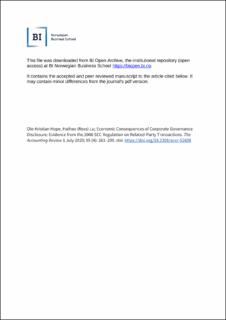Economic consequences of corporate governance disclosure: Evidence from the 2006 SEC regulation on related-party transactions
Journal article, Peer reviewed
Accepted version
Permanent lenke
https://hdl.handle.net/11250/2994983Utgivelsesdato
2020Metadata
Vis full innførselSamlinger
- Scientific articles [2181]
Sammendrag
This paper examines economic consequences of a 2006 Securities and Exchange Commission regulation that mandated public firms to disclose their governance policies on related-party transactions (RPTs). Employing hand-collected RPT data for S&P 1500 firms, we find that the initiation of RPT governance disclosure significantly reduces the occurrence of RPTs, and that the reduction in RPTs is negatively associated with the implied cost of capital (ICC) and positively related to Tobin's Q. These effects are more pronounced for low-monitored firms and for firms with RPTs that are more likely to be opportunistic. We further find that firms with a formal written policy, a designated committee to review and approve RPTs, or more extensive disclosure on RPT governance benefit in terms of lower ICC.
